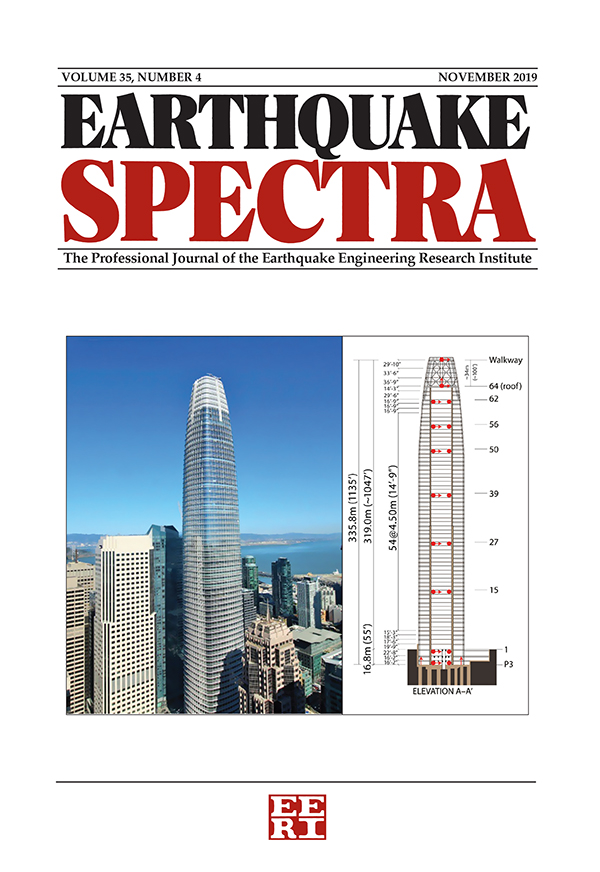Ground-motions site and event specificity: Insights from assessing a suite of simulated ground motions in the San Francisco Bay Area
IF 3.7
2区 工程技术
Q2 ENGINEERING, CIVIL
引用次数: 0
Abstract
This article presents the results of a research that is part of a larger collaborative effort between the Lawrence Berkeley National Laboratory and the Pacific Earthquake Engineering Research Center, funded by the US Department of Energy Office of Cybersecurity, Energy Security and Emergency Response. The main objective of this study is to assess a suite of near and far-field simulated ground motions obtained from 20 realizations of an M7 Hayward Fault earthquake in the San Francisco Bay Area, California USA, and inform the selection of rupture simulation parameters leading to strong motions. To this aim, comparisons are conducted with NGA-W2 and directivity ground-motion models and a selected population of records. An archetypal steel moment-resisting frame is utilized to assess infrastructure response distributions. The analyses carried out for each simulated event and subdomain with consistent properties in terms of shallow shear-wave velocity proved to be instrumental for better interpreting the differences between simulated motions and empirical models. The main reasons identified for variances between simulations and empirical relationships included (1) directivity effects fully captured by the simulations across the full breadth of rupture models; (2) site vicinity to ruptures that incorporate large-slip patches, particularly if these are in the forward-directivity direction; and (3) presence of geologic structures that can “trap” seismic waves and produce ground motions with large amplitude and long signal duration. The analyses carried out in this work provide a path for interpreting ground-motion site and event specificity obtained from a suite of physics-based simulations, differing only in the rupture model characterization, to inform the selection of simulation scenarios for site-specific engineering analyses under strong excitations. Evidence from this work points to the possibility that current hazard models may underestimate ground-motion intensities in areas where the combined effect of directivity and site conditions results in large ground-motion amplitudes.地震动的地点和事件特异性:评估旧金山湾区一系列模拟地面运动的启示
本文介绍的研究成果是劳伦斯伯克利国家实验室和太平洋地震工程研究中心之间更大范围合作的一部分,由美国能源部网络安全、能源安全和应急响应办公室资助。本研究的主要目的是评估从美国加利福尼亚州旧金山湾区 M7 海沃德断层地震的 20 次模拟中获得的一套近场和远场模拟地面运动,并为选择导致强烈运动的破裂模拟参数提供信息。为此,与 NGA-W2 和指向性地动模型以及选定的记录群进行了比较。利用一个典型的钢制矩抵抗框架来评估基础设施的响应分布。事实证明,对每个模拟事件和具有一致浅层剪切波速度特性的子域进行的分析有助于更好地解释模拟运动与经验模型之间的差异。模拟结果与经验模型之间存在差异的主要原因包括:(1)模拟结果完全捕捉到了各种断裂模型的指向性效应;(2)现场附近的断裂包含大的滑动斑块,尤其是当这些斑块位于前向指向性方向时;以及(3)地质结构的存在可能会 "捕获 "地震波,并产生振幅大、信号持续时间长的地面运动。这项工作中进行的分析为解释从一套基于物理的模拟(仅在破裂模型特征方面存在差异)中获得的地震动场址和事件特异性提供了一条途径,为在强激励下进行特定场址工程分析时选择模拟方案提供了依据。这项工作提供的证据表明,目前的灾害模型可能会低估地动强度,因为在这些地区,方向性和场地条件的综合影响会导致较大的地动振幅。
本文章由计算机程序翻译,如有差异,请以英文原文为准。
求助全文
约1分钟内获得全文
求助全文
来源期刊

Earthquake Spectra
工程技术-工程:地质
CiteScore
8.40
自引率
12.00%
发文量
88
审稿时长
6-12 weeks
期刊介绍:
Earthquake Spectra, the professional peer-reviewed journal of the Earthquake Engineering Research Institute (EERI), serves as the publication of record for the development of earthquake engineering practice, earthquake codes and regulations, earthquake public policy, and earthquake investigation reports. The journal is published quarterly in both printed and online editions in February, May, August, and November, with additional special edition issues.
EERI established Earthquake Spectra with the purpose of improving the practice of earthquake hazards mitigation, preparedness, and recovery — serving the informational needs of the diverse professionals engaged in earthquake risk reduction: civil, geotechnical, mechanical, and structural engineers; geologists, seismologists, and other earth scientists; architects and city planners; public officials; social scientists; and researchers.
 求助内容:
求助内容: 应助结果提醒方式:
应助结果提醒方式:


